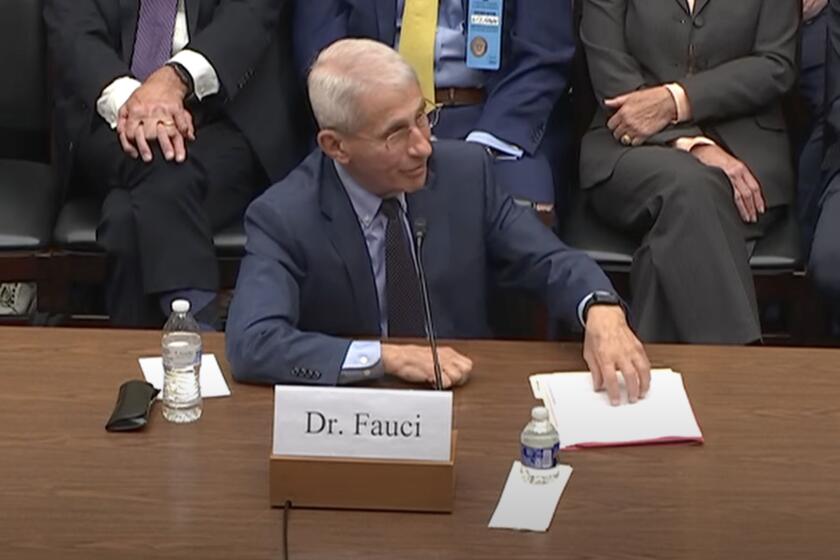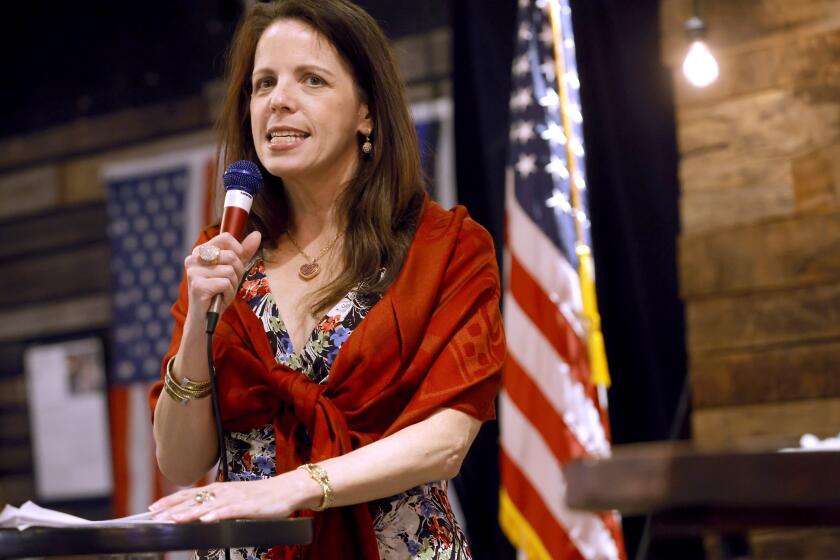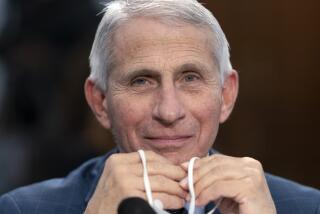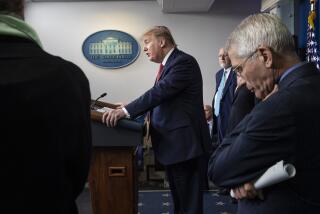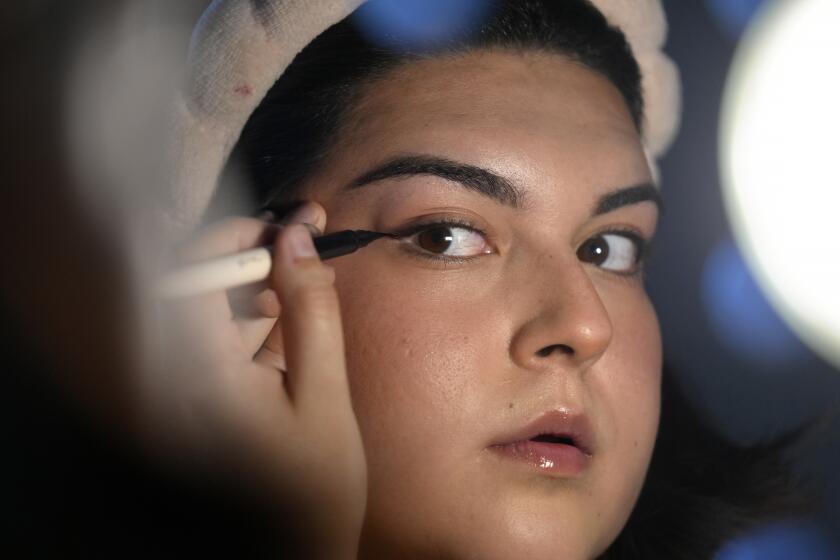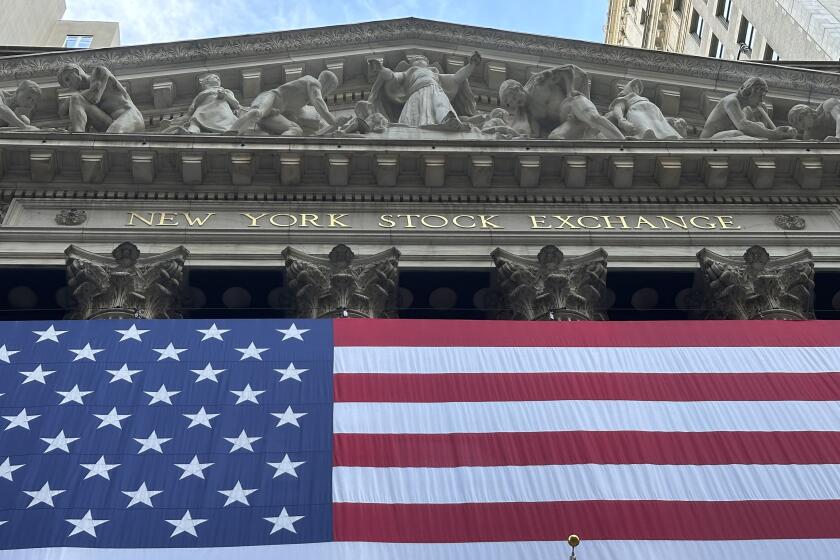Column: Anthony Fauci’s memoir strikes a crucial blow against the disinformation agents who imperil our health

Just after Thanksgiving 2021, Dr. Anthony Fauci visited a high school in the Anacostia neighborhood of Washington, D.C. His goal was to promote the safety of COVID-19 vaccines in a primarily Black community, where vaccine rates were lower than in the rest of the capital.
Fauci was joined by Barack Obama — the fifth of the seven presidents he would serve during his more than half-century career as a public health official. Together they made the rounds of vaccination booths in the school gym, posing for photos. As they were getting into their cars after the visit, Obama turned to him with a word of encouragement.
Fauci had been accused by congressional crackpots such as Sens. Rand Paul (R-Ky.) and Jim Jordan (R-Ohio) of having helped to create the COVID virus, unleashing the pandemic, and by Rep. Marjorie Taylor Greene (R-Ga.) of having masterminded nationwide pandemic shutdowns. Credible death threats against him had prompted the government to provide him with 24-hour security protection.
AIDS had made me a target, but that was largely before social media.... Now my family and I were barraged by emails, texts, and phone calls ... with foul language and sexually explicit messages and threatened with violence and even death.
— Anthony S. Fauci
Obama’s advice carried so much weight that Fauci, 83, has used it, in its original Latin, as the title of a chapter of his newly published memoir, “On Call: A Doctor’s Journey in Public Service.” That chapter, concerning the maelstrom of abuse he sustained as a right-wing whipping boy during the pandemic, is called “Illegitimi Non Carborundum.”
Published in mid-June, “On Call” is an indispensable addition to the growing shelf of books by medical and scientific professionals fighting back against the tide of disinformation undermining public health in the U.S.
Get the latest from Michael Hiltzik
Commentary on economics and more from a Pulitzer Prize winner.
You may occasionally receive promotional content from the Los Angeles Times.
Over the last few months I’ve reported on others, including “The Deadly Rise of Anti-Science” by pediatrician and immunologist Peter Hotez and “We Want Them Infected” by neurologist Jonathan Howard, which demolishes the claims of anti-vaccine ideologues such as Stanford’s Jay Bhattacharya.
This year has brought us not only Fauci’s book but “Tell Me When It’s Over” by vaccine expert Paul Offit, which takes aim at the “COVID myths,” which anti-vaxxers have wholesaled to encourage vaccination resistance in the general public.
Fauci’s book stands out because its author has chosen to place the abusive, ignorant treatment he received from disinformation grifters in and outside of government beginning with the Trump years in the context of his long career as a public servant.
His work started with his joining the National Institutes of Health as a fellow in 1968, at the age of 27. He stayed there, as a staff member and ultimately as director of the National Institute of Allergy and Infectious Diseases, until his retirement in 2022.
Dr. Peter Hotez is a vaccination expert who has nothing to do with COVID. The GOP’s COVID committee just put him in its crosshairs -- but why?
Over that time, Fauci became the nation’s most respected and influential immunologist. His public role first emerged with the appearance of AIDS in 1981. Within a few months, he decided to leave the routine research he had been doing on human immune response and focus instead on “this mysterious new disease seemingly restricted at this point to gay men.”
It was a soul-crushing experience. The cause of AIDS was not understood until 1983, when the human immunodeficiency virus, or HIV, was identified as the culprit. There were no effective treatments, much less a cure. Fauci describes himself watching powerlessly as NIAID wards filled with patients facing a death sentence.
“None of my training or temperament,” he writes, “provided a bulwark against that horrible, inevitable outcome.... All of us who worked on the ward with those patients had to stuff away our feelings of loss, day after day, just to be able to carry on.”
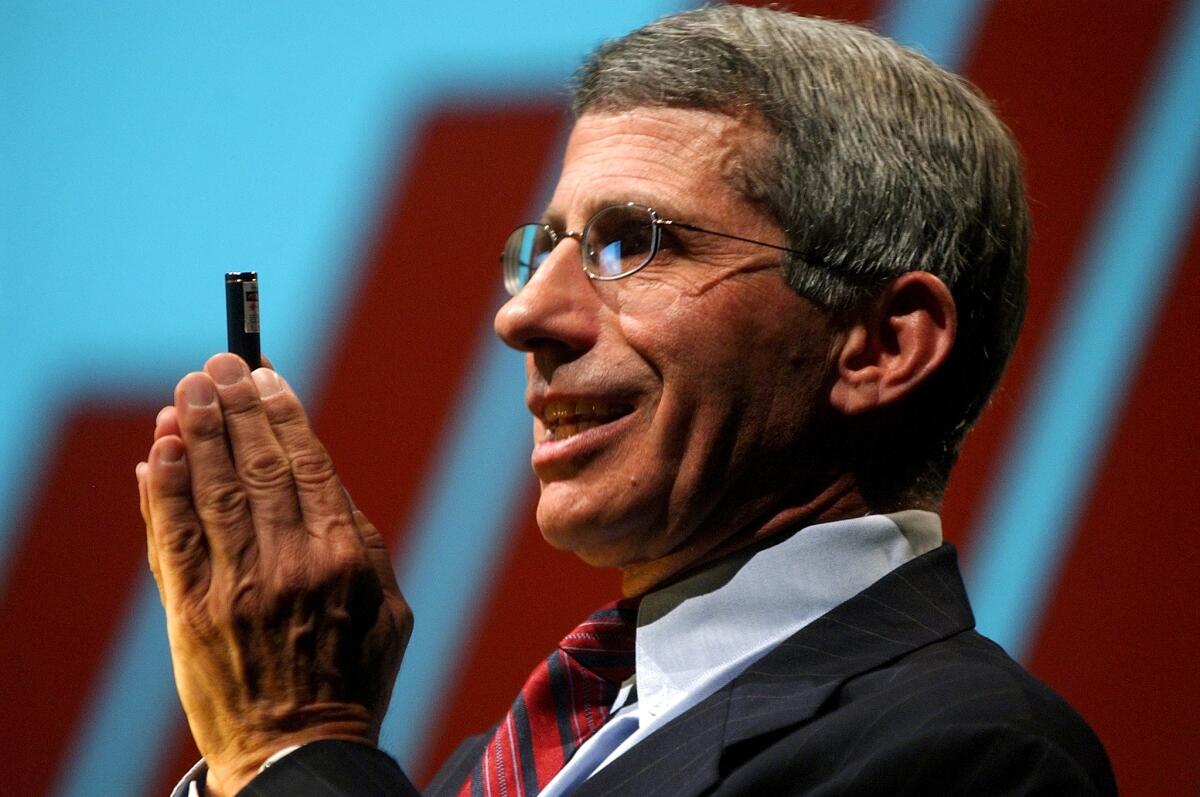
Fauci also became a target of AIDS activists, who blamed him for failing to persuade his bureaucratic superiors to pull out all the stops on AIDS research — among them the playwright Larry Kramer, who in 1988 wrote an op-ed in the San Francisco Examiner headlined “I Call You Murderers, an Open Letter to an Incompetent Idiot, Dr. Anthony Fauci.”
Yet Fauci’s efforts to bring Kramer and other activists into the official meetings, and his championing of a full-scale government program to battle the disease, ultimately brought them together by the time Kramer succumbed to AIDS in 2020. “A complex relationship, indeed,” Fauci writes.
But the experience with AIDS didn’t prepare Fauci for the abuse he received as “the de facto public face of the country’s battle” with COVID. “AIDS had made me a target, but that was largely before social media,” he writes. “Now my family and I were barraged by emails, texts, and phone calls... with foul language and sexually explicit messages and threatened with violence and even death.” Right-wingers and GOP politicians even called for Fauci’s prosecution.
The House GOP attacks Anthony Fauci, one of America’s most accomplished public health officials, labeling him a ‘criminal’ and worse without a speck of substantiation
The problem began with Trump, who was courteous with Fauci in private and even seemed to accept his truth-telling about the seriousness of the developing crisis — but at public rallies dismissed COVID as a Democratic “hoax.”
Fauci is judicious about many of the administration officials he worked with as a member of Trump’s COVID task force, including Vice President Mike Pence, who Fauci says seemed sincerely to face up to the crisis but was hamstrung by his sedulous fealty to Trump. But he’s contemptuous about those who exploited the public’s unfamiliarity with the scientific method to cast doubt on necessary pandemic countermeasures and hype useless nostrums.
“People associate science with absolutes,” he writes. But science is a process in which new information is absorbed and evaluated, leading to new conclusions.
That was the case with the government’s advice against masking, issued when the pandemic was new, its means of transmission unknown, and hospitals were suffering a severe shortage of surgical masks and other protective equipment.
When the shortages eased and it became clear that masks would help stem the spread of COVID, the advice changed — but was portrayed on the right as an example of deliberate deceit by government experts.
Those who earned Fauci’s contempt include Peter Navarro, a Trump economic advisor who marched into a White House meeting after Fauci had dismissed hydroxychloroquine, an antimalarial drug Trump was touting as a COVID treatment, dumped a pile of papers on the table and barked at Fauci: “I have all the evidence in the world that hydroxychloroquine works. And by preventing people from getting it, you have blood on your hands!”
EcoHealth Alliance, which developed research allowing humankind to defeat the next viral pandemic, is officially cut off from federal funding. Democrats who connived with the GOP to do this should hang their heads in shame.
Navarro is currently serving a prison sentence for ignoring a subpoena from a House committee investigating the Jan. 6, 2021, insurrection.
Fauci’s inclination to be candid about the perils of COVID and the value of social counter-methods eventually led to his being muzzled by the White House, barred from appearing on cable news shows even as the COVID toll increased inexorably. Nearly 1.2 million Americans have succumbed to the disease, the U.S. toll from which is by far the worst in the developed world.
“Attacks on me came daily,” Fauci relates. Right-wing organizations and Republicans in Congress kept “digging for something that would discredit me. When nothing was found, they just made up stories with no evidence whatsoever to back them up.”
Paul advanced the baseless charge that Fauci’s institute, via a grant to the research organization EcoHealth Alliance, had caused the pandemic, even though the research EcoHealth had funded at China’s Wuhan Institute of Virology could not conceivably have produced the SARS-CoV-2 that causes COVID.
In his book, Offit, director of the Vaccine Education Center at Children’s Hospital of Philadelphia and a member of the Food and Drug Administration panel that rules on the safety and efficacy of vaccines, traces his own experience with the anti-vaccine movement.
Offit ably traces the origin of the modern anti-vaccine movement to a fact-free campaign in 1982 blaming the whooping cough vaccine for childhood injuries, which was taken up by the mass media but had no basis in fact. It was augmented by a fraudulent 1998 paper tying the MMR (measles/mumps/rubella) vaccine to autism.
Warnings of retribution, pictures of guillotines — anti-vaxxers are becoming more unhinged in their fight against pandemic policies.
The paper was eventually retracted by its publisher, the British journal the Lancet, and its main author, Andrew Wakefield, was stripped of his British medical license. But the paper’s infliuence is still shown by resistance to the MMR vaccine in Britain and pockets in the U.S., where Wakefield is lauded by anti-vaccine agitators as a hero.
Offit shows how the messaging of anti-vaxxers has evolved from claims about the purported health hazard of vaccines into a movement for “medical freedom” — the right of individuals to decide for themselves “what we can or can’t put into our bodies or the bodies of our children.”
That turns the very concept of public health on its head. “Public health had morphed into private decisions, the public be damned,” Offit writes.
He ties the anti-vaccine movement to other health-related conspiracy-mongering, such as the notion that COVID originated in that Chinese lab, despite overwhelming scientific evidence that it reached humans the way other viruses have throughout history — as a spillover from wildlife in contacts with humans.
Even before that, the drumbeat of campaigns against vaccines resulted in a dangerous skepticism about science just when sober scientific judgments were most needed.
“The outside impact of these conspiracy theories on the American public meant that the war against Covid would soon become a war against ourselves,” Offit writes. “Much of the suffering and deaths from Covid could have been prevented had people chosen to be vaccinated. But they believed the myths. As a result, hundreds of thousands of people died needlessly.”
Doctors and scientists have been pondering with ever-increasing urgency how to combat the tide of science denialism that infects public health policymaking and public discourse. They’re facing a tough enemy, because the underlying driver of conspiracy movements is grift — the purveying of disinformation for profit and fame — witness the rise of anti-vaxxer Robert F. Kennedy Jr. to political prominence.
Fauci, Offit, Hotez, Howard and other responsible scientists are placing their livelihoods, reputations and even their safety on the line to bring the facts to the American public. They’re heroes, and we must heed their efforts to protect science from charlatans and frauds, for our own good.
More to Read
Get the latest from Michael Hiltzik
Commentary on economics and more from a Pulitzer Prize winner.
You may occasionally receive promotional content from the Los Angeles Times.

